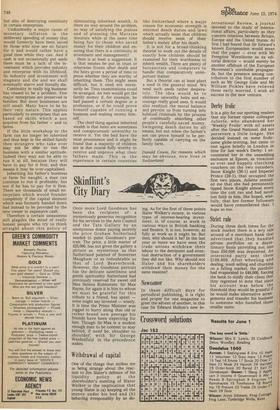Skinflint's City Diary
Once more Lord Goodman haS been the recipient of . a mysteriously generous recognition for his services to the Arts Council and the Tate Gallary by an anonymous donor paying secretly the price Graham Sutherland needed to paint Goodman's portrait. The price, a little matter of £25,000, has not given the gallery a picture as mysterious as that Sutherland painted of Somerset Maugham or as redoubtable as that of Lord Beaverbrook. However, the Goodman portrait has the delicate saintliness and gentle spirituality Sutherland had previously reserved for sweet old Miss Helena Rubinstein. Sir Max Rayne, for again it is him to whom we must be grateful for this tribute to a friend, has spent — some might say invested — wisely. It is time the Prime Minister was jogged to hurry along that old or rather brand new peerage his friends have been expecting for him. Though Sir Max is a modest enough man to be content to stay behind, if need be, shoulder to shoulder; with Sir George Weidenfeld in the precedence stakes.
Withdrawal of capital
One of the things that strikes me as being strange about the reaction to Jim Slater's defence of his liquidity policy at the shareholder's meeting of Slater Walker is the implication that young Slater is (a) keeping all the money under his bed and (b) behaving irresponsibly by so do ing. As for the first of these points Slater Walker's money, in various types of interest-bearing investment, is, of course, at work in various ways in British banking and finance. It is not, however, as fully at work as it might be. But then, why should it be? In the last year or more we have seen the trade unions withdraw their labour to the detriment and eventual destruction of a government they did not like. Why should not Slater and his shareholders withdraw their money for the same reasons?
Newcomer
In these difficult days for periodical publishing, it is right and proper for one magazine to greet the advent of another, in this case Sir Edward Hulton's new In ternational Review, a journal devoted to the study of international affairs, particularly as they concern relations between Britain, Europe and the United States. At first I had feared that Sir Edward's known Europeanism would mean that the paper — even with Mr Peregrine Worsthorne as its editorial director — would merely be another offshoot of the European Movement's unreliable propaganda, but the presence among contributors to the first number of such as Mr George Gale and Mr William Pickles have relieved these early worried. I wish all success to the new venture.
Derby frolic
It is a pity for our sporting readers that my former tipster colleague Juliette, who abandoned her 'Weekly Frolic' with nil assets after the Grand National, did not persevere a little longer. She decided instead on some frolicsome globe-trotting, but came to rest again briefly in London in time for last week's Derby. I encountered her in the unsaddling enclosure at Epsom, as vivacious as ever and happily clutching vouchers on the two outsiders, Snow Knight (50-1) and Imperial Prince (20-1), that occupied the first two places. Juliette reminded me that she had persistently tipped Snow Knight almost every time the colt ran and had never lost faith in him. She hoped, wistfully, that her former followers would have remembered that. I hope so too.
Strict rule
During these dark times for the stock market there is a wry tale around of a merchant bank that advertised that they handled private portfolios on a discretionary basis providing not less than £50,000 was deposited. An interested party sent them £100,000. After wheeling and dealing, wash selling and churning on a falling market, the portfolio had evaporated to £48,000, forcing the bank to notify their client that they regretted to note that since his account was below the threshold they would be grateful If he would make alternative arrangements and transfer his business to someone who handled these smaller sums.


































 Previous page
Previous page